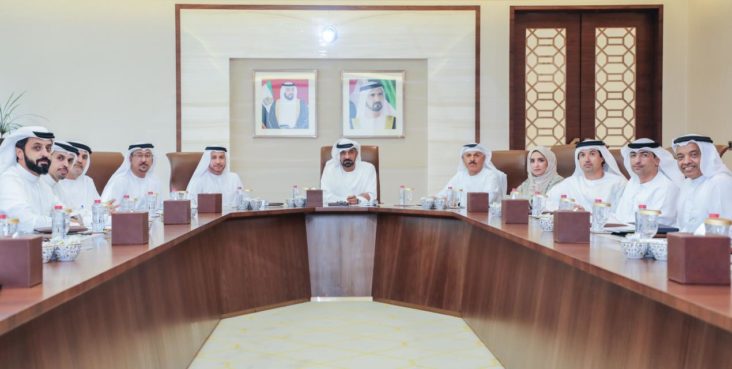Dubai Free Zones Council Submits E-Commerce Initiative To The Executive Council Of Dubai

His Highness Sheikh Ahmed bin Saeed Al Maktoum, Chairman of the Dubai Free Zones Council (DFZ Council), headed its 12th meeting that discussed the latest developments across initiatives and industries. The first item on the agenda was the completion of the Council’s e-commerce initiative proposal that was submitted to The Executive Council of Dubai for implementation.
Following the recent announcement about developing a comprehensive geo-economic map of Dubai aligned with the Fifty-Year Charter, issued by His Highness Sheikh Mohammed bin Rashid Al Maktoum, Vice President and Prime Minister of the UAE and Ruler of Dubai, the Council members also appointed the team that will work on the initiative as a second order of business.
The team is tasked with assigning economic objectives to each geographical area to advance the overall economic diversification of the emirate with the support of the Department of Economic Development in Dubai, Dubai Chamber of Commerce and Industry, Dubai Development Authority, Jebel Ali Free Zone, the Dubai International Financial Centre, Dubai Customs, Dubai Municipality, the World Free Zones Organization, and the Ministry of Economy.
His Highness Sheikh Ahmed bin Saeed Al Maktoum said: “The DFZ Council aspires to position Dubai as a regional driver of sustainable economic growth, as well as a reference point for forecasting the future in various fields, including education and innovation, while reflecting the outcomes of the Fourth Industrial Revolution. Following the directives of the UAE’s visionary leaders, we have completed a study on our e-commerce initiative and look forward to constructive feedback from The Executive Council of Dubai.”
He noted that the Council works tirelessly to build on its pioneering experience in implementing successful initiatives through leveraging promising opportunities that emerge as an outcome of new economic systems, such as sharing economy, green economy, and digital economy. Through the comprehensive geo-economic map of Dubai, the DFZ Council aims to continue exploring new horizons and examine new operational frameworks for a sustainable economy.
The council also recommended to conduct market research on optimal ways of supporting the halal industry, a study on sharing Dubai’s best practices in establishing free zones abroad, and a comprehensive assessment of industry-focused free zones.
The Council members discussed the recent launch of the National Artificial Intelligence Strategy 2031 by the Government of the UAE that seeks to contribute to shaping a knowledge economy while encouraging innovation and establishing an integrated economic system that enhances quality of life and drives sustainable growth.
In line with the DFZ Council’s sustained efforts to improve ease of doing business across the free zones in Dubai, the members endorsed the recommendation to implement the requirement of an insurance policy instead of a bank guarantee for free zone-based companies. In addition to safeguarding employee rights, this will boost liquidity for the companies and attract greater investment capital.
Furthermore, the Council members reached a preliminary agreement on the One Free Zone Passport initiative, allowing companies licensed at a single free zone to also operate in other free zones in Dubai without the need for a second license.
At the meeting, the Council members were briefed on the recent memorandum of understanding signed with Dubai Customs on the implementation of the Virtual Stock Guarantee scheme. The agreement seeks to boost re-exports from free zones to external markets as part of Dubai Customs’ efforts to consolidate Dubai’s position as a global economic hub.
The DFZ Council also stressed the importance of facilitating bank transactions for businesses and investors operating in free zones while following international policies to combat money laundering. As an overarching goal, the Council aims to coordinate with the General Directorate of Residency and Foreigners Affairs and the Federal Tax Authority to enhance the performance of businesses operating in free zones.
The Council members agreed to meet with representatives of Dubai Land Department and The Supreme Legislation Committee to discuss the possibility of exempting free zone companies from registering leased property at the Department.
Concluding the meeting, the Council welcomed the recent law issued by the UAE Cabinet in collaboration with The General Secretariat of The Executive Council of Dubai, the Ministry of Economy, and Dubai Statistics Center to set up a database of all UAE-based business owners and investors.


